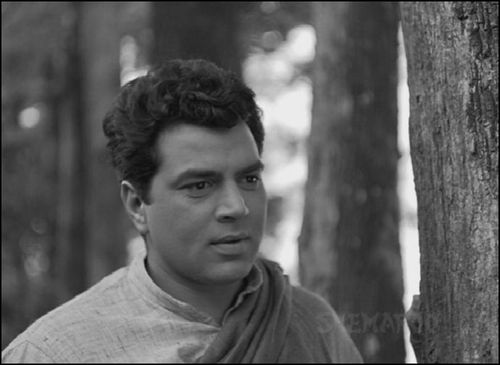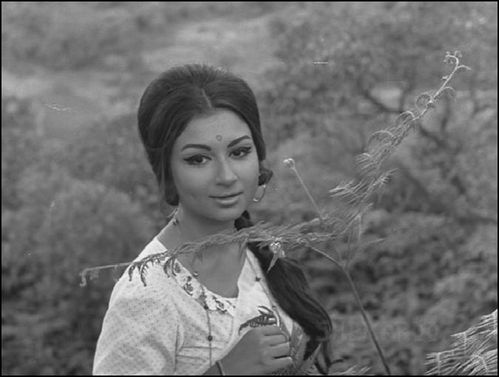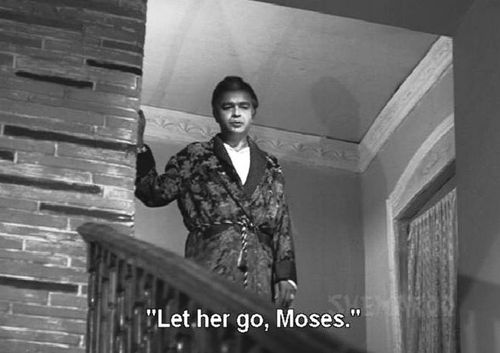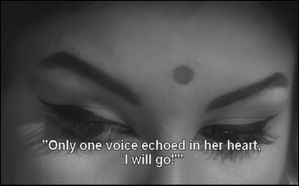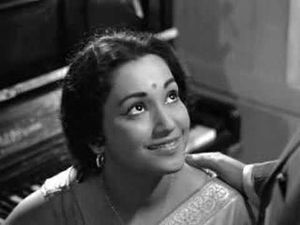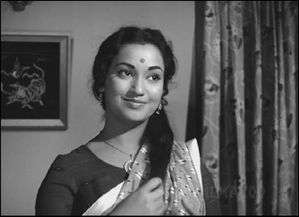Anupama, where the dream-fairies slumber
Publié le 12 Avril 2010
Anupama, by Hrishikesh Mukherjee, centres around the character of Uma (Sharmila Tagore), a shy and silent girl, sole daughter of a cruel father (Tarun Bose) who lost this beloved wife when she gave birth to this daughter. He blamed her for the death of his wife, and has got stuck in this absurd hatred which has permanently traumatised Uma. But around this centre revolves other characters, especially Ashok (Dharmendra), the young teacher-poet who will open her up to herself and to love. Of course he will be attracted to her, to her mystery and her beauty, and the quintessential scene of revelation is one that takes place on a wooded hillside, to the tune of Kuch dil ne kaha:
Now for me this song is the origin of my fascination with this movie. It was Pitu (here) who first allowed me to realize that such a gem existed! Later she sent me the translation for the song (sung by Lata, written by Kaifi Azmi, Shabana Azmi’s father, and music by Hemant Kumar) and added these words for me: “I LOVE this song because the lyrics and the picturisation are so.... fey. Fey is the only word, I feel like the Queen of Fairies is going to alight any moment. It's such a haunting song, and the way the song is sung by Lata Mangeshkar, she drops her voice to a whisper at times. The fog in the video, the wildflowers, these lyrics, they really have a gossamer quality to it, illusory almost.” (The song says at one stage: Palkon ki thandi sej par sapno ki pariyaan soti hain - On the cool bed of the eyelashes, the dream-fairies slumber) So thanks Pitu, and a 1000 more thanks.
But what is really Ashok watching? Wherein does the mysterious charm of this song lie? In the clarity of early morning, Ashok walks out of the house towards the wooded hillside. A few yards down, Uma is singing and he stops to watch and listen. But what he's witnessing is really the birth of music, in its pristine powerful magic. Because the girl who couldn’t talk has become, chrysalis-like, the source of the most wonderful song. This metamorphosis of silence into song is the very definition of poetry. You can see all this on Dharmendra’s face, much more, I think, than on Sharmila’s. She is beautiful, and the photographer (full credits to Jaywant Pathare for his fantastic job) captures her slow exquisite charm for us to contemplate. Yet, I still prefer (and I’m a man!) Dharmendra’s gaze in the scene. First I quite recognize why somebody like Daddy’s girl could actually entitle her blog “In praise of all things Dharmendra-related” – crazy title, but quite understandable! Then one has to say that Dharm has that full persona which some actors cannot completely hide, and that betray them at times: they’re themselves slightly more than the characters they’re supposed to impersonate. In Anupama, you can notice this slight unease in the scene when he has to sing in half-darkness:
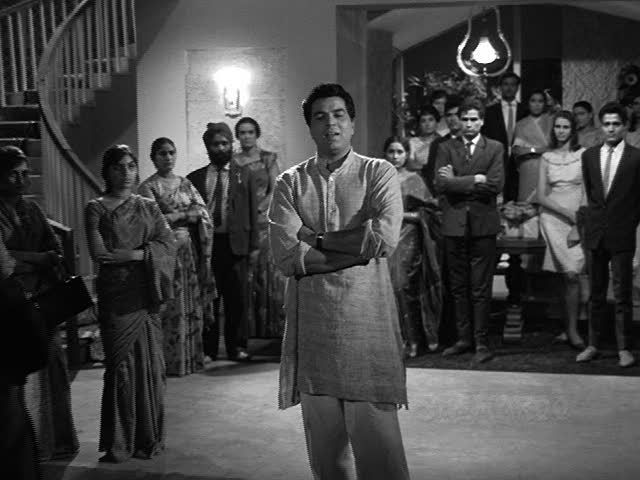
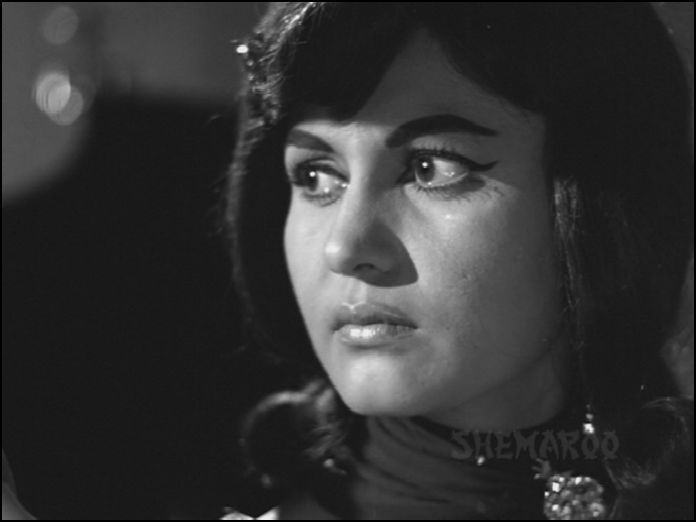
This scene is important because it functions as a parallel scene to the hillside one described above. It takes place at a family meeting for Annie’s birthday. Annie (Shashikala) is the exasperatingly bubbly daughter of one of Uma’s father’s friends. Until now, she’s done nothing but exaggerate the “girlie” tricks which will serve as a backdrop for what’s going to happen during that song. Ashok arrives late, and as a compensation is asked to recite a poem, which he reluctantly accepts to do, saying that he will probably spoil the party's cheerful mood. Annie lowers the lights, and he starts his grave and rather embarrassed song. But as he sings, Annie is transformed (above). She’s getting engaged with another guy, Arun, but clearly Ashok is doing something to her, and I think it’s the emotionality of poetic suggestiveness that penetrates her, and makes her pass from the superficial person she used to be to the sensible grown-up she becomes later. It seems that thanks to what she has felt during that moment of poetry, Annie has matured. She is now the friend whose influence will help the two lovers meet and be strong enough to brave M. Sharma, Uma’s formidable father. She’s now the woman who reminds Ashok that beautiful philosophies can always be changed, that life isn’t worth being lived if one can’t love (pic below on the right).
So one could say that Ashok, having heard the enlightening Word coming from Uma’s silence, has become the prophet who is now able to awaken listeners to the essence of their own being. Uma’s Song of love, entering Ashok’s soul, is transmuted into poetry, and silences Annie the chatterbox who from now on will listen instead, and change her general demeanour into that of a sensitive young woman.
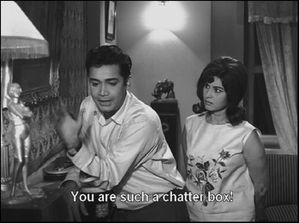
What does a prophet do? He communicates with the divinity, and translates the divine inspirations into human language. If the hearts of his listeners are open, they can then free themselves from the alienating instincts and passions, and reach a state of serenity where their souls are at peace. They are no longer the victims of fear, of violence or greed, but on the contrary theirs are the quiet minds of the good and the holy. In all religions, we have this striving for a spiritualised state where man is master of himself and lives on friendly terms with the world around him.
This is what happens to Uma: first a prisoner in her father’s house, shut up in shock and fear and guilt, speechless because communication means a socialisation which is denied her, she will slowly (helped by Ashok) open up to the realisation that her enemy is as much within her as outside her, and that she has to vanquish the demons that are keeping her imprisoned against her will. The theme of communication plays an important role in the movie, the emphasis on the telephone, especially, is there to dramatize the difficulties of passing from silence to speech, from imprisonment to freedom.

What’s interesting is that this theme concerns other people, most notably Uma’s father, who is also imprisoned in his hatred, and incapable of freeing himself without help. It will be again Ashok’s duty to make him see that he, the rich and superior businessman, is the one who needs help. There’s a very good scene, in which Dharmendra comes out shining: his friend Arun, first promised to Uma, had gone to M. Sharma to try and tell him of the fact that he’s in love with Anita (Annie), but had failed to admit it, and so had to find a pretext for his visit: his friend Ashok is without work, could M. Sharma find him a position? Uma’s father accepts, and summons the poet. He tells him he accepts to give him that job, but that Ashok will have to leave his self-respect at the door, because in such jobs competition is fierce, and people move up by flattering and fawning. Naturally Ashok refuses and delivers the old man a lesson, leaving him angry and stunned.
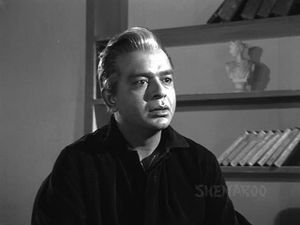 We have another “prophet” in the group of friends, a great character: Moses, whom Uma considers as her uncle (whatever his status really is). He's a lawyer by trade, but also a born comedian, and he acts as the jolly clown, always telling funny stories and performing crazy pranks. Clearly he’s Sharma’s opposite; he understands human aspirations, and his task is to mend relationships and suggest solutions to problems between people. Once Arun and Annie come to see him to get some advice about their union. Arun tells them of the difficulties of his being promised to Uma whereas he loves Annie. He’s fallen in love with the wrong girl. But this is Moses’ magnificent answer:
We have another “prophet” in the group of friends, a great character: Moses, whom Uma considers as her uncle (whatever his status really is). He's a lawyer by trade, but also a born comedian, and he acts as the jolly clown, always telling funny stories and performing crazy pranks. Clearly he’s Sharma’s opposite; he understands human aspirations, and his task is to mend relationships and suggest solutions to problems between people. Once Arun and Annie come to see him to get some advice about their union. Arun tells them of the difficulties of his being promised to Uma whereas he loves Annie. He’s fallen in love with the wrong girl. But this is Moses’ magnificent answer:
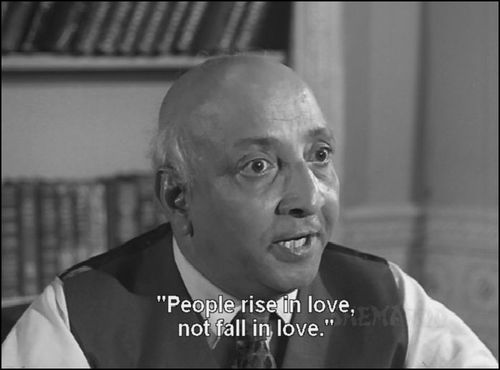
That an old man should think so highly of love, as opposed to arranged unions and preordained social ties is like a prophecy, a divine intervention: Moses asserts the rights of nature, of the goodness of humanity created in God’s image, made to experience love which flows from the heart and reverberates on the whole body. Moses of course is also the name of the liberator of Israel, the one chosen by God to free the chosen People, and lead them out of the land of slavery to the promised land of milk and honey. Thus both Moses and Ashok represent the choice of natural reason and unfettered feelings as the foundations of civilisation, as opposed to the forces of self-interest and social alienation. Ashok the poor poet and teacher, Moses the wise and merry visionary: two heroes whose combined efforts unite to wrench youth and beauty away from the shackles of envy and “mind-forged manacles” (W. Blake).
In the end, in a move one might liken to a divinely-provoked Exodus (y’all remember “Let my people go”?), Uma reads the book Ashok has written, called “Anupama” (The Nonesuch), which tells her to leave her old life, and crosses the Dead Sea of her father’s rage, who unwittingly is turned into Pharaoh:
Led by Moses, she walks towards the Promised Land where the Word has called her since the beginning. This is a clever parallel, drawn between situation of women as the oppressed class in Indian society, and the Hebrews led out of slavery. Anupama also contains many wonderful moments which I haven’t mentioned in this brief review, and I wouldn’t like to close before pointing out the feminine grace of Uma’s mother (played by Surekha), as well as that of her foster-mother, Sarla (Dulari), and this surrogate mother is another reference to Moses’ story: seen from this angle, Uma becomes the one saved from the waters and the saviour of her people. I believe this is a fit message for Hrishikesh Mukherjee’s movie: that the one who has been so ruthlessly punished and abandoned as a child should turn into a source of deliverance and freedom for all.
Just before I finish: a fun take on the movie may be found here (Bollyviewer) She also mentions a valuable review from stardust. And here below are some Surekha-filled meethi-meethi moments!
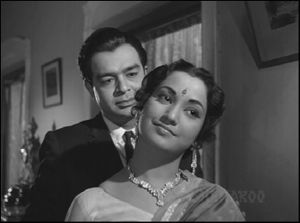
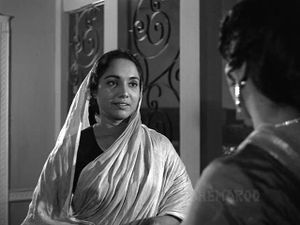
/image%2F1489169%2F20200220%2Fob_9722d6_banner-11.JPG)
